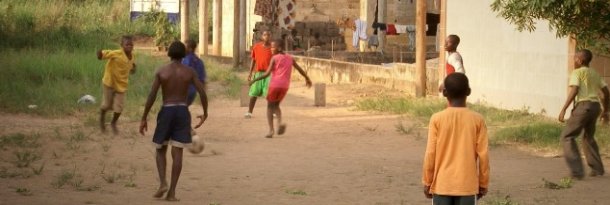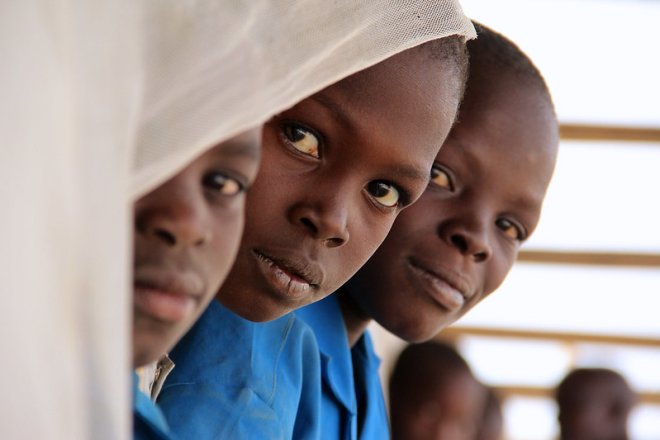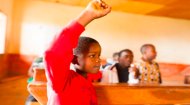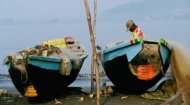|
|
Child poverty in Cameroon is a widespread problem, affecting nearly half of the country's children. About 5 million children (44.2% of the child population) live below the national poverty line, and nearly 50% of children live in multidimensional poverty, which includes deprivations in areas like nutrition, health, water, sanitation, housing, and education. Malnutrition is a major issue for children in Cameroon with recent data showing stunting is around 27% nationally (up to 40% in some areas), while wasting is 23% in some research, with stunting being linked to low breastfeeding rates and insufficient diet diversification. Other studies highlight high rates of underweight and thinness. Micronutrient deficiencies, particularly anemia and low iron, are prevalent, affecting many children and women.
Housing conditions vary dramatically across the country and directly impact a child's health and development. In rural villages, homes are often constructed from traditional materials like mud bricks or wood, with thatched or, more commonly today, corrugated iron roofs. Several family members may share a single room, and access to basic amenities like electricity, clean running water, and proper sanitation is often a luxury. This lack of infrastructure contributes to significant health risks. In the bustling cities, while some families live in modern concrete homes, many children grow up in densely populated, low-income neighbourhoods where housing is cramped and infrastructure is strained. These living conditions create a challenging environment for a child to study, play, and simply be a child. Religion and culture are deeply woven into the fabric of daily existence, providing both a moral compass and a sense of community. Cameroon is predominantly Christian and Muslim, with a significant portion of the population also adhering to indigenous animist beliefs, which often coexist with the major faiths. For children in Cameroon, this means that life is punctuated by religious festivals, community gatherings at the church or mosque, and a strong set of moral teachings instilled from birth. These institutions often serve as more than places of worship; they are community centres that provide social support, education, and a sense of identity, anchoring children in a shared cultural and spiritual heritage. |
Children in Cameroon |
Children in Cameroon |
Children in Cameroon | Children in Cameroon |
For information, videos and photos about the African nation of Cameroon, check out our profile pages.
More >
|
|

|
Daily life, particularly in rural areas where the majority of the population reside, begins early. A child’s day might start before dawn with chores essential to the family's survival, such as fetching water from a communal well, gathering firewood, or tending to livestock and crops before making the often long journey to school on foot. In urban centres like Douala or Yaoundé, life moves to a different rhythm, but the expectation of contributing to the household remains, whether through running errands, cleaning, or caring for younger siblings. Education in Cameroon is widely regarded as the most promising pathway to a better future, and parents often make immense sacrifices to send their children to school. Officially, primary education is compulsory and free, but the reality for many families is far more complex. The associated costs of uniforms, textbooks, writing materials, and unofficial parent-teacher association fees can be prohibitively expensive, forcing many children to drop out. Traditional values also work against girls who, as across so much of Africa, are expected to attend to domicilliary chores and work to earn an income for their families. The education system is divided into compulsory primary school which lasts for six years, five years of secondary education and two years of high school. Classrooms, especially in public schools, are frequently overcrowded, with a single teacher sometimes responsible for over sixty students. Resources are scarce, and the quality of instruction can vary greatly. A unique aspect of Cameroon's education is its bilingual system, a legacy of its colonial history, with instruction offered in either French or English. Cameroon faces significant challenges in its water and sanitation sector, with only 70% of the population having access to safe water and a mere 43% to basic sanitation, highlighting a large rural-urban gap, but even water supplies in cities such as the capital Yaoundé pump out dirty, often contaminated water. In more rural communities, particularly in the north west, the only water available is from muddy, tributary rivers which can be an hour's walk there and back from home, and the water collected is from the same rivers that livestock use as well as clothes are washed in. As such, water related sicknesses amongst children in Cameroon are high. (Above, an image of a young boy collecting water from a rural well.) While the country has ample water resources, inadequate infrastructure, rapid urbanization, and poor resource management impede progress. This situation leads to high rates of waterborne diseases and impacts public health, particularly for children. The Cameroonian government and organizations such as UNICEF are working to address these issues through initiatives to improve access to clean water and sanitation facilities, with a goal of reaching 60% sanitation coverage by 2030. This is also a major concern for chiildren in Cameroon at school as 75% of schools in some areas have no toilets or washing facilities. (This lack of water is also cited as a reason why many girls in Cameroon fail to attend education, particularly at certain times each month). There are also ongoing concerns about the trafficking of children within Cameroon driven by systemic poverty with girls being trafficked for domestic servitude in wealthier households and sexual exploitation and boys being forced to work either on family farms cultivating cocoa or coffee, or for others in agriculture as well as in factories, street selling and fishing. Of note is that Cameroon does not appear to accept this as a problem, and whilst, under duress, some arrests have been made for the trafficking of children, no prosecutions followed. As well as internal trafficking, Cameroon is also known as a transit country for trafficking of children between two of its neighbours, Nigeria and Gabon. The video above provides further insights into the life of children in Cameroon together with children's projects you may want to support. |


 Health remains a major concern, with diseases like malaria, respiratory infections, and waterborne illnesses being all too common. According to UNICEF, the under-five mortality rates, while improving, remain high, reflecting the struggles in accessing quality healthcare, particularly in remote regions and there are around 350,000 children in Cameroon who have been orphaned by AIDS. Many of these orphaned children, along with others who escape poverty or family breakdown, end up on the streets surviving through vending, begging or stealing.
Health remains a major concern, with diseases like malaria, respiratory infections, and waterborne illnesses being all too common. According to UNICEF, the under-five mortality rates, while improving, remain high, reflecting the struggles in accessing quality healthcare, particularly in remote regions and there are around 350,000 children in Cameroon who have been orphaned by AIDS. Many of these orphaned children, along with others who escape poverty or family breakdown, end up on the streets surviving through vending, begging or stealing.






